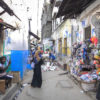The Digital Culture Program has been working in collaboration with various partners in the digital humanities, libraries, and computational social sciences to create packages of self-directed training modules and resources. These resources will be aggregated and hosted as SSRC Labs. Today, the first series of modules, Doing Digital Scholarship (DoingDS), goes live.
DoingDS (labs.ssrc.org/dds), created in collaboration with the Roy Rosenzweig Center for History and New Media (RRCHNM) at George Mason University, is a set of introductory lessons and readings on a variety of topics, from foundational skills like building a professional identity online to more advanced topics like mapping and spatial analysis and how digital methodologies affect pedagogy. The lessons are based on RRCHNM’s successful Doing Digital History summer institutes, with the curriculum expanded outward to include other social science and humanities disciplines and modified for self-directed rather than in-person instruction.
There is no required level of familiarity with digital scholarship topics or methodologies, and the modules are designed to be accessible and practical for scholars and interested parties at all career levels, from undergraduate and graduate students to tenured professors and committee members who might need to evaluate digital projects. With this aim in mind, the modules were beta-tested extensively by a cohort of SSRC fellows with varying levels of technical proficiency. We continue to welcome feedback, which you can email to digitalculture@ssrc.org.
To learn more and make use of the modules, visit labs.ssrc.org
SSRC Labs and the SSRC Digital Literacy Initiative are generously supported through funding from Richard Witten.













